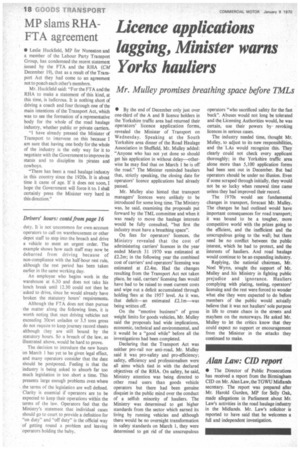Licence applications lagging, Minister warns Yorks hauliers
Page 24

If you've noticed an error in this article please click here to report it so we can fix it.
• By the end of December only just over one-third of the A and B licence holders in the Yorkshire traffic area had returned their operators' licence application forms, revealed the Minister of Transport on Wednesday. Speaking at the South Yorkshire area dinner of the Road Haulage Association in Sheffield, Mr. Mulley added: "Anyone who has not yet done so should get his application in without delay—otherwise he may find that on March 1 he is off the road." The Minister reminded hauliers that, strictly speaking, the closing date for operators' licence applications had already passed.
Mr. Mulley also hinted that transport managers' licences were unlikely to be introduced for some long time. The Ministry was, he said, examining the proposals put forward by the TML committee and when it was ready to move the haulage interests would be fully consulted, "but first the industry must have a breathing space".
On fees for operators' licences, the Ministry revealed that the cost of administering carriers' licences in the year ended March 31 1970 was estimated at £2.2m; in the following year the combined cost of carriers' and operators' licensing was estimated at £2.4m. Had the changes resulting from the Transport Act not taken place, he said, carriers' licensing fees would have had to be raised to meet current costs and wipe out a deficit accumulated through holding fees at the 1957 level. As it was, that deficit—an estimated £2.1m—was being written off.
On the "emotive business" of gross weight limits for goods vehicles, Mr. Mulley said the proposals had wide implications, economic, technical and environmental, and it would be a "good while" before all the investigations had been completed.
Declaring that the Transport Act was neither pro-rail nor anti-road, Mr. Mulley said it was pro-safety and pro-efficiency; safety, efficiency and professionalism were all aims which tied in with the declared objectives of the RHA. On safety, he said, Ministry attention was being directed to other road users than goods vehicle operators but there had been genuine disquiet in the public mind over the conduct of a selfish minority of hauliers. The Ministrywas determined to get higher standards from the sector which earned its living by running vehicles and although there would be no overnight transformation in safety standards on March 1, they were determined to get rid of the unscrupulous
operators "who sacrificed safety for the fast buck". Abuses would not long be tolerated and the Licensing Authorities would, he was certain, use their powers by • revoking licences in serious cases.
The industry needed time, thought Mr. Mulley, to adjust to its new responsibilities, and the LAs would recognize this. They clearly could not check every applicant thoroughly; in the Yorkshire traffic area alone more than 5,100 application forms had been sent out in December. But bad operators should be under no illusion. Even if some scraped through initially, they would not be so lucky when renewal time came unless they had improved their record.
The 1970s would see fundamental changes in transport, forecast Mr. Mulley. The changes he had outlined would have important consequences for road transport; it was bound to be a tougher, more competitive world with the prizes going to the efficient, and the inefficient and the unscrupulous going to the wall; but there need be no conflict between the public interest, which he had to protect, and the interests of hauliers. And road haulage would continue to be an expanding industry.
Replying, the national chairman, Mr. Noel Wynn, sought the support of Mr. Mulley and his Ministry in fighting public prejudice and ignorance. Hauliers complying with plating, testing, operators' licensing and the rest were forced to wonder what else they were expected to do before members of the public would actually believe that it was not hauliers' sole purpose in life to create chaos in the streets and mayhem on the motorways. He asked Mr. Mulley to let the critics know that they could expect no support or encouragement from the Minister in the attacks they continued to make.








































































































